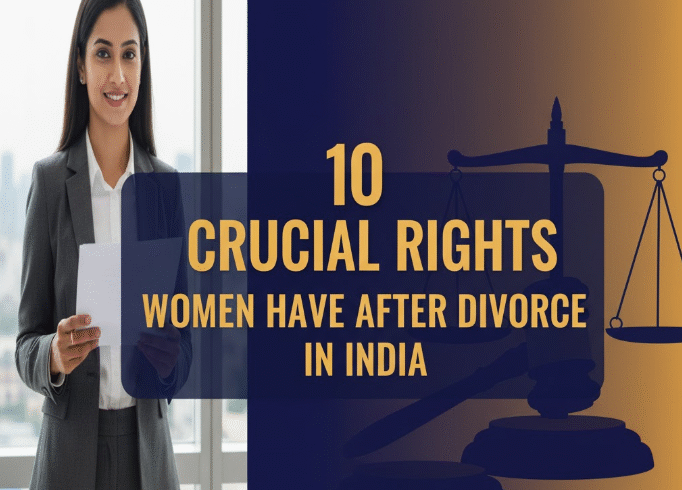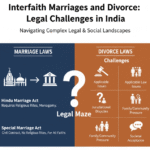The Divorce That Freed Her to Find a Better Man
At its best, marriage is forever, but at times it’s just not how things go. For a couple seeking to end their marriage in India, they are navigating a legal system that can seem complex and overwhelming. If you’re contemplating a divorce, in the midst of one, or just want to know your rights, this guide will help you navigate it all — from judicial separation to spouse support through pregnancy.
What Is So Special About Indian Divorce Laws?
There is no single divorce law in India applicable to all. Instead, there are varying laws per religious community. That means the process and rules differ, depending on your religion.
Who follows which law?
| Religion | Relevant Law |
|---|---|
| Hindu, Sikh, Jain or Buddhist | Hindu Marriage Act, 1955 |
| Muslim | Muslim Personal Law (Shariat) Application Act, 1937 |
| Christian | Indian Divorce Act, 1869 |
| Parsi | Parsi Marriage and Divorce Act, 1936 |
| Inter-faith or non-religious | Special Marriage Act, 1954 |
Either way, the essentials are more or less the same despite all of these differences in laws. You have to have good grounds for a divorce and the court must be convinced that the marriage is genuinely at an end.
Two Routes to Divorce in India
If you and your spouse agree to terminate your marriage, you can do so through mutual consent or contested divorce. Let’s break down both.
Mutual Consent Divorce – Quickest Way
Mutual consent divorce is the easiest, simplest and fastest type of divorce.
This is when both husband and wife are of the belief that they want to be divorced. Fighting in court will often be more expensive, time-consuming and emotionally draining.
How does it work?
The couple must both consent to the divorce and its essential issues.
Requirements:
- Married One Year Required: You must be married for at least one year.
- Separate residencies: The couple has to maintain separate residences for at least one year (though this provision may vary)
- Two court dates: You will have two court appearances, and a waiting period between them.
The timeline looks like this:
- First step: File joint petition, appear in court together
- Cooling-off Period: Wait for 6 months (might be waived in some cases)
- Second motion: Appear again, stand by your decision
- Decree of divorce: It is the judgment in favor of divorce
India’s supreme court has ordered that courts can waive the six-month waiting period if both parties are “absolutely certain” and no chance of reconciliation exists.
Cost factor: Mutual consent divorces will cost between ₹15,000 to ₹50,000 depending on your lawyer and which city you live in.
Contested Divorce: When You Disagree
This occurs when one spouse desires a divorce and the other does not, or you are unable to agree on important issues such as child custody and how property should be divided.
What you need to know:
- Much longer process (3-5 years or more)
- Costly (₹50,000 to few lakhs)
- Requires valid legal grounds
- Includes evidence, witnesses and several hearings
Valid Grounds for Filing Divorce
You can’t just walk into court and declare, “I want a divorce.” You must have a reason when you seek a divorce, called “grounds.”
Grounds Common to Both Husband and Wife
- Adultery: Your partner had intercourse with someone else
- Cruelty: Repeated conduct that makes it impossible to live together due to physical or mental torture
- Desertion: You were deserted by your spouse for at least two years without any interruption
- Conversion: Your husband or wife switched religion
- Mental Illness: Schizophrenia which makes cohabitation impossible
- Leprosy: Most severe form of the disease
- Venereal disease: Infectious sexually transmitted disorder
- Renouncement: Your spouse departs from everything in the material world
- Presumed death: Your spouse is missing for more than seven years or has disappeared beyond all reach or contact
Special Grounds for Wives Only
The law acknowledges that women may confront special problems. Below are the conditions under which a wife can seek divorce:
- If husband is impotent
- The husband has a second “live” wife
- Her husband has raped or sodomized her or committed bestiality
- She had married under 15 and annulled the marriage before 18
The “Irretrievable Breakdown” Debate
Some courts have awarded divorces on grounds of “irretrievable breakdown of marriage” — that is, the married parties are so broken they can’t be fixed. But it’s not officially on the books yet, and courts exercise discretion on a case-by-case basis.
How to File for Divorce: A Step-by-Step Process
The process of filing for divorce is multi-faceted. Here’s what you can expect:
Step 1: Hire a Lawyer
Though you can participate in the process on your own, a lawyer streamlines everything. Make sure he/she specializes in family law and has handled divorce cases. For expert legal guidance, visit Zista Legalis.
Step 2: File the Petition
Your attorney will prepare a petition for dissolution that contains:
- Personal details of both spouses
- Marriage details (date, place, witnesses)
- Children’s information (if any)
- Cause of divorce and facts thereunder
- What you want the court to give you (child custody, alimony, property)
This application is lodged in the family court of your territory.
Step 3: Serve Notice on Your Spouse
The court will send a notice to your spouse that you have filed a divorce petition. In this initial complaint your spouse has 30 days to make a response.
Step 4: Response and Counter-Claims
Your spouse can:
- Agree to the divorce
- Contest the divorce
- File and answer counter-petitions for alimony or custody
Step 5: Evidence and Arguments
Both sides present:
- Papers (marriage certificate, proof of grounds)
- Witness statements
- Legal arguments
Step 6: Court Hearings
Multiple hearings take place where:
- Both parties present their case
- Witnesses are cross-examined
- Judges can encourage the parties to visit a mediator or therapist
Step 7: Final Judgment
In the end, the judge either:
- Grants the divorce decree
- Rejects the petition
- Suggests reconciliation
Child Custody: What is Best for the Children?
This is frequently the most emotional part of divorce cases. Indian courts continue with the well-established rule that what is paramount is the welfare of the child.
How Courts Decide Custody
General preference according to child’s age:
- Below 5 years: Mother (the tender years doctrine)
- Between 5 and 9: Mother, with the father’s opportunity to contest
- After the age of nine: Child’s preference is considered
- 18+ years: Child makes its own decision
Types of Custody Arrangements:
- Physical custody: Determines where the child lives
- Legal custody: Who gets to decide about education, health, religion
- Shared custody: Parents have shared responsibilities
- Sole custody: One parent has full control
- Visitation rights: Parent without custody has time with child at certain times
The court considers:
- Parent’s financial stability
- Emotional bond with the child
- Each parent’s character and conduct
- Child’s age and preferences
- Parenting capacity of parents

Inside India’s Divorce System: What Every Spouse Should Know
Financial Aspects: Alimony and Maintenance
Financial considerations are vital in a divorce. The law guarantees that the financially weaker partner (usually the wife) isn’t left high and dry after divorce.
Types of Financial Support
- Pendente lite support: Support paid during divorce proceedings
- Permanent alimony: One-time or recurring payment after divorce
- Child support: For children’s expenses
How Much Alimony?
There’s no fixed formula. Courts consider:
- Husband’s income and assets
- Income of wife and her capacity to earn
- Standard of living during marriage
- Duration of marriage
- Age and health of the two parties
- Children’s needs
Standard amount: They are usually around 25 to 35 percent of the husband’s net monthly income, though this varies widely.
Can Husbands Get Alimony?
Yes! The reverse is also true i.e. if the wife has a greater income than the husband he can claim maintenance. But in reality this is almost never happening.
When Can Alimony Be Denied?
Reasons a wife may not qualify for alimony:
- She has adequate income and/or assets
- She remarries
- She’s living with another partner
- She was unfaithful during marriage
Property Division in Divorce
Such automatic 50-50 property division laws do not exist in India, unlike some Western countries.
The underlying principle: Each person takes what’s in their name.
However, courts can:
- Order division of property acquired in the marriage
- Consider indirect contributions (like homemaking)
- Give stridhan to the wife
- Order sale of property and division of proceeds
What is Separate Property?
- Property owned before marriage
- Inherited property
- Gifts received individually
What Might Be Shared?
- House bought during marriage
- Joint bank accounts
- Investments made during marriage
How Long Does Divorce Take?
| Type of Divorce | Average Length |
|---|---|
| Mutual consent | 6-18 months |
| Contested (simple) | 2-3 years |
| Contested (complex) | 3-5 years or longer |
Why so long?
- Overloaded court system
- Multiple adjournments
- Attempts at reconciliation
- Complex evidence gathering
- Appeals and counter-appeals
The customary grind of Indian legal system comes into play and it may take a decade or more to get rid of your spouse in an obviously hopeless marriage.
Fast-track options: Many family courts are already adhering to fast track mutual consent divorces completing them hopefully in less than 6 months.
Divorce Process for Certain Communities
Muslim Divorce Laws
Muslim marriages follow different procedures:
For men:
- Talaq: Husband says ‘I divorce you’ three times
- Triple Talaq: Instant divorce (illegal now after 2019 law passed)
For women:
- Khula: A divorce at the instance of a wife, with mutual consent
- Judicial dissolution: Decree in court on grounds of its choice
The Muslim Women (Protection of Rights on Marriage) Act, 2019 criminalized instant triple talaq.
Christian Divorce
For Christians, the Indian Divorce Act of 1869 was amended in 2001 to grant both men and women equal rights. Earlier, men could do so on adultery alone but women required more grounds — this discriminatory provision is removed.
Parsi Divorce
Parsis are governed by the Parsi Marriage and Divorce Act, 1936 whose grounds largely mirror those under Hindu law but with few community-specific provisions.
Your Rights During Divorce Proceedings
As a Husband:
- Right to contest false allegations
- Right to custody of children
- Right to fair property division
- Protection from misuse of laws
As a Wife:
- Right to maintenance
- Right to remain in the matrimonial home during process
- Right to stridhan
- Right of child custody
- Protection from domestic violence
For Both:
- Right to fair hearing
- Right to legal representation
- Right to present evidence
- Right to appeal
For more information on family law matters, you can also visit the Ministry of Law and Justice.
Common Mistakes People Make
- Concealing assets: Courts don’t take kindly to dishonesty
- Deploying children as weapons: Courts don’t like this
- Oversharing on social media: Your posts are evidence
- Mediation denied: Sometimes it is best to compromise and not fight indefinitely
- Not taking notes of abuse: Save proof of cruelty or harassment
- Violating a court order: This may result in contempt of court charges
- Not getting court orders for financials: Always get everything in writing
Mediation and Counseling: Resolving Disputes in Alternative Modes
Mediation is often a requirement for couples before filing for divorce in court. This involves:
- Neutral third-party mediator
- Confidential discussions
- Finding middle grounds through consent
- Quicker and cheaper than court fights
- Less adversarial and stressful
Most family courts have compulsory mediation sessions during which couples are encouraged to meet with trained counselors to discuss the possibility of reconciliation.
Life After Divorce: What Changes?
Once your divorce is finalized:
- Legal status: You are legally single and can remarry
- Name: Women may go back to maiden name (court order required)
- Financial independence: Each party to the marriage earns their own income and controls finances
- Co-parenting: You’ll need to collaborate if you have kids
- What society thinks: Divorce is still frowned upon in some cultures, but its social acceptability seems to be increasing
- Healing: Give yourself time, get professional help if necessary

Inside India’s Divorce System: What Every Spouse Should Know
Frequently Asked Questions
Q1: Can I get a divorce without my wife/husband agreeing to it?
Yes, through contested divorce. You’ll need to have valid reasons for doing so, which you will be required to prove in court. It takes a little longer, but it doesn’t require your spouse’s concurrence.
Q2: How long is divorce completed in India?
For mutual consent divorce, minimum requirement is 6-7 months (including the ‘cooling off’ period, though it may be waived). Contested divorces take more time — typically two to five years.
Q3: Are wedding presents returned during divorce?
Gifts made directly to you (i.e. stridhan for women) generally do not have to be returned. But gifts given to both of you or to the family may need to be divided up, or returned, depending on the circumstances.
Q4: Can my spouse’s parents be joined in the divorce case?
Not automatically. However, if you have any specific complaints against the in-laws (such as harassment or cruelty), you can file separate cases under appropriate laws like Section 498A (cruelty by husband’s relatives).
Q5: What if I have a spouse in another country?
You can file for a divorce in India if your last residence as a couple was in India, or even if you are still living in India. The court will give notice through email, WhatsApp or via the Indian Embassy in that country.
Q6: Is it impossible to get custody if I’m a working mother?
No. Courts do not discriminate against working mothers. It doesn’t matter if you work — it matters that you can properly care for the child. And in reality there are some upsides of a job to financial safety.
Q7: Is alimony modifiable after the divorce?
Yes. Either party can ask the court to change alimony if there’s a big change in circumstances — such as job loss, serious illness or remarriage.
Q8: Is going to live in before finalized the divorce called adultery?
The law is complex here. If you’re married, it could be considered adultery. But if you are in the midst of a divorce and have been living apart for years, some courts may think differently.
Q9: What should I do if my spouse is insane, yet we live together?
Yes, but only if the mental illness is severe and incurable and makes it impossible to live together. You will need medical evidence, and the court doesn’t want to divorce someone if they can be cared for.
Q10: What if my spouse initiates a false case of Domestic Violence?
You have a right to refute with proof. Most courts are on to false cases, and will scrutinize any claim closely. You may also file for quashing of the FIR in High Court if you are able to establish that allegations are false.
Final Thoughts
Divorce is never easy to go through. It’s emotionally exhausting, financially demanding and legally complicated. But understanding the process, and your rights in it, can make it less cumbersome.
Remember these key points:
- Opt for mutual consent, if you can – it’s quicker and less painful
- Documentation of everything related to your case
- Hire an experienced family lawyer
- Concentrate on the best for your kids
- Do not be hasty in making decisions when angry or hurt
- Mediate before costly court proceedings
- Take care of your mental health while in the process
Indian laws with respect to divorce are going through a paradigm shift, moving from being purely protectionist of those of the weaker gender. Though the system has many flaws, courts are more and more turning their focus to what’s just, fair and in the best interest of all family members — especially children.
If you are thinking about divorce, discuss your situation with an experienced family law attorney who can advise you according to your circumstance. No two divorce cases are alike, and you need the professional guidance to safeguard your rights and interests.
Divorce ends one chapter of your life, but it’s also the start of a new one. It is possible to get the information and support you need to navigate India’s divorce process with competent legal representation, allowing you to transition into a new chapter in life.
For personalized legal assistance with your divorce case, contact Zista Legalis today.





